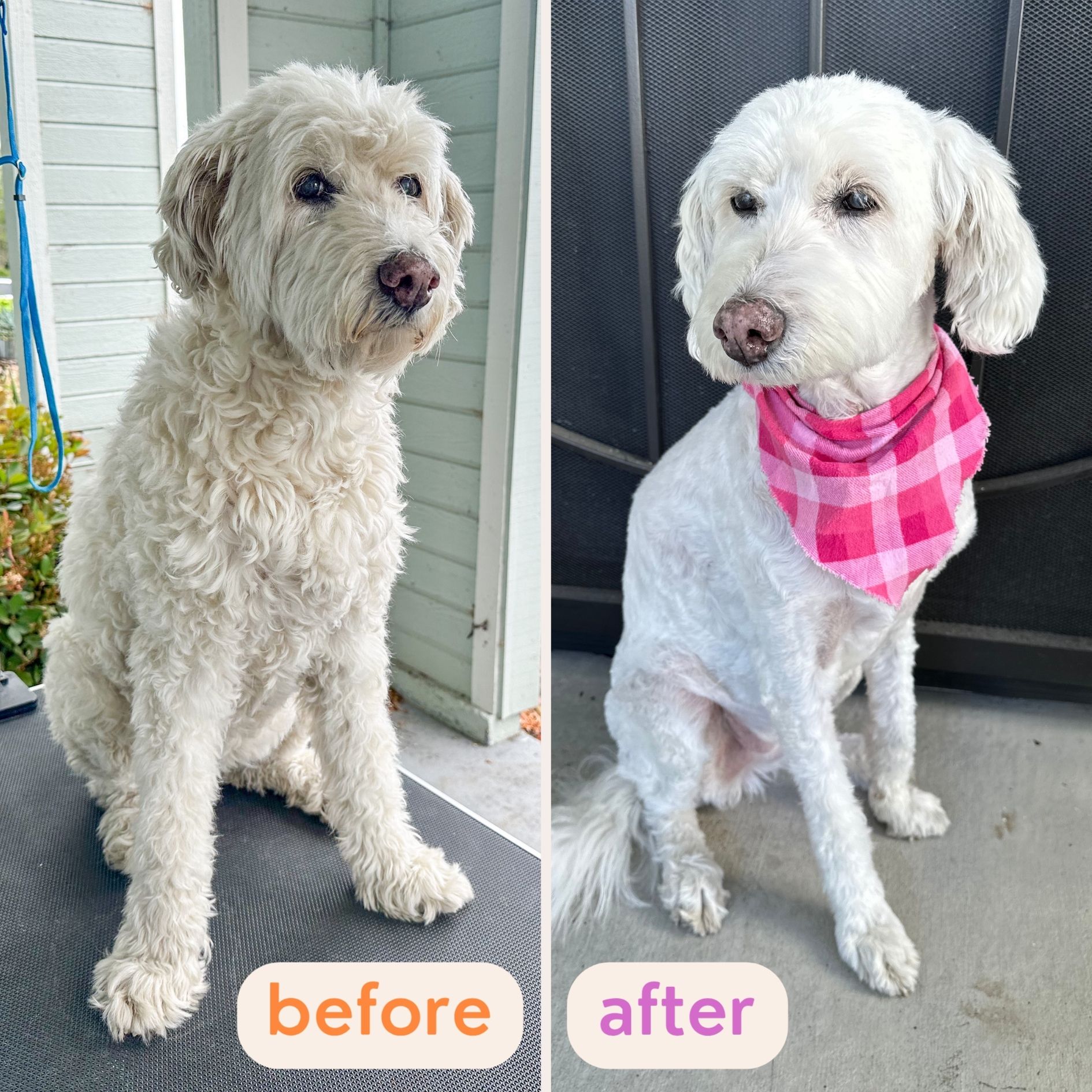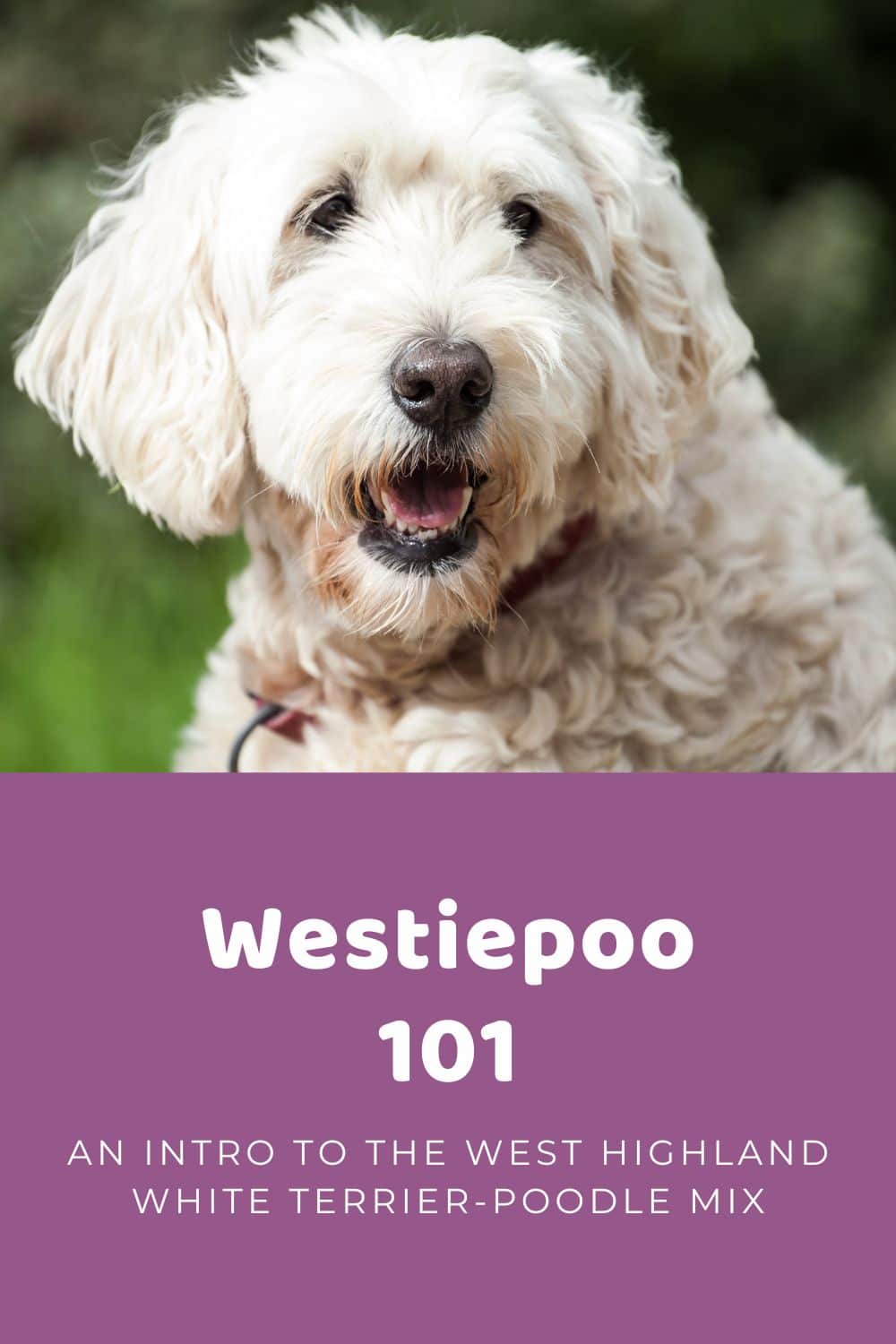Not much is known about the adorable Portidoodle, a.k.a the Portuguese Water Dog-Poodle mix, in the general public. After all, these Doods are still so hard to come across. But this doesn’t make them any less amazing. In this guide, we’re going to learn all the deets about the beautiful, amazing, and oh so wonderful Portidoodle crossbreed. Whether you’re interested in learning more about this rarity Poodle mix or consider getting a Portidoodle yourself, then this guide is the best place to start doing your research about the Portuguese Water Dog-Poodle mix.
Table of Contents
- What Is A Portidoodle?
- Portidoodle Physical Appearance
- Portidoodle Pictures (Puppy & Adult)
- Portidoodle Size: How Big Will A Portidoodle Get?
- Portidoodle Variations & Generations
- Personality & Temperament
- Portidoodle Health: Do Portidoodles Have Health Problems?
- Portidoodle Lifespan: How Long Do Portidoodles Live?
- Exercise Requirements
- Training A Portidoodle
- Coat Care & Grooming
- Where Can You Get Portidoodle Puppies?
- Portidoodle: FAQ
What Is A Portidoodle?
The Portidoodle is a hybrid cross between the Portuguese Water Dog and Poodle. They’re adventurous and athletic, like their Portuguese Water Dog parents, and just as intelligent and playful as Poodles. They’re also insanely affectionate dogs, making them perfect companions for people looking for a cuddly, yet active companion.
Interestingly enough, both Portuguese Water Dogs and Poodles have curly, water-repellent coats that an untrained eye can often mistake for the other. In fact, both of these purebreds have historically been working dogs – in the water! Portuguese Water Dogs were bred to help fishermen, while Poodles were bred for hunting waterfowl.
To be fair, Portidoodles’ (a.k.a Portipoos) parents share many similar qualities, such as their activity levels, athletic capabilities, high levels of intelligence, and also their sweet and loving nature.
Although the Portuguese Water Dog-Poodle mix is still very new and rare in the canine world, they’re certainly on their way to becoming one of the most beloved Doodle breeds in the upcoming years.
Portidoodle Physical Appearance
The Portidoodle is a small to medium-sized dog, depending on the size of the Poodle used in the mix. Portidoodles have an athletic build, and they flaunt a fluffy, tightly curled or wavy coat all over the body. They also have floppy ears, similar to both Poodles and Portuguese Water Dogs.
Portidoodle Colors
Portidoodles can inherit their coat colors either from the Portuguese Water Dog with its signature black, brown, and white hues, or they may also take after the Poodle parent. From the Poodle’s side of their lineage, they may inherit coat colors like black, blue, brown, silver, gray, apricot, cream, red, cafe au lait, or white. It’s also not uncommon for Portidoodles to inherit a combination of these colors, including beautiful patterns like phantom, parti, abstract, or sable.
Coat, Shedding, & Hypoallergenic Level
Portidoodles have wavy or tightly curled coats that are low-shedding and allergy-friendly. Some will even say hypoallergenic! But, we must add that there’s not a single breed that’s 100% hypoallergenic. Not even the Poodle.
What triggers dog allergies in humans are the protein particles found in dog dander, saliva, and urine. Of course, if a dog has a double coat and therefore sheds hair, all of those particles are much more likely to end up on your furniture, clothes, and air, triggering those uncomfortable allergic reactions.
The great thing about the Portidoodle is that both of its parents are single-coated breeds. As a result, the Portidoodle won’t have a shedding undercoat, regardless of how much they inherit from each side of their lineage.
As the purebred Portuguese Water Dog can have either a shaggy wavy coat or a more tightly curled coat, some Portidoodles may also inherit that wavy coat type. Although generally very allergy-friendly, they might shed a tiny bit more due to the wavy hair being more relaxed and not trapping in loose dog hair as the curly coat does.
Another thing to remember is that curly-coated Portidoodles tend to be more high-maintenance compared to wavy-coated Portipoos. Typically, curly coats get much more easily tangled, resulting in knots and mats that are tricky to get out. Likewise, dirt, debris, and dust will get stuck inside the curly coat more easily.
Portidoodle Pictures (Puppy & Adult)
Now, we’ve talked enough about what a Portidoodle looks like. It’s time for you to see for yourself how gorgeous Portidoodles are:
| Black Portidoodle | @haven_the_portidoodle |
| Black & White Portidoodle | @luna.the.portidoodle |
Portidoodle Size: How Big Will A Portidoodle Get?
Portidoodles are small to medium-sized dogs with an athletic build. Standard Portidoodles usually weigh between 40 and 65 pounds with an average height between 17 and 25 inches. Mini Portidoodles can weigh between 15 and 40 pounds and they’re also shorter, measuring in at 10 to 20 inches.
| Mini Portidoodle | Standard Portidoodle | |
| Weight | 15-40 pounds | 40-65 pounds |
| Height* | 10-20 inches | 17-25 inches |
| When Full-Grown? | 11-13 months | 12.5-16 months |
*A dog’s height is measured from its withers – the highest part of its shoulder blades.
The Portuguese Water Dog-Poodle mix most commonly uses the Standard Poodle, resulting in a medium-sized Standard Portidoodle. With Standards, males tend to be slightly heavier and taller than females.
However, if you’re lucky enough to come across a Mini Portidoodle, their size can significantly vary depending on their generation and the size of their parents. Keeping in mind that the Miniature Poodle is a significantly smaller dog than a purebred Portuguese Water Dog, it might be difficult to predict how their offspring will turn out in first-generation variations.
Portidoodle Variations & Generations
While Portidoodles today generally come as first-generation pups, there are also multiple other potential variations to this hybrid breed. Here’s a quick overview of the possible Portidoodle generations:
| 1st Parent | 2nd Parent | % Portuguese Water Dog* | % Poodle* | |
| F1 Portidoodle (first-generation) | Portuguese Water Dog | Poodle | 50% | 50% |
| F1B Portidoodle (first-generation backcross) | F1 Portidoodle | Poodle | 25% | 75% |
| F1BB Portidoodle (first-generation backcross backcross) | F1B Portidoodle | Poodle | 12.5% | 87.5% |
| F2 Portidoodle (second-generation) | F1 Portidoodle | F1 Portidoodle | 50% | 50% |
| F2B Portidoodle (second-generation backcross) | F1 Portidoodle | F1B Portidoodle | 37.5% | 62.5% |
| F2B Portidoodle (alternate cross) | F2 Portidoodle | Poodle | 25% | 75% |
| F3 / Multigen Portidoodle | F1B Portidoodle or higher | F1B Portidoodle or higher | Varies | Varies |
*These are generic calculations only – genetics are rarely mathematically accurate.

As we mentioned in the previous section of this article, it can be tricky to predict the outcome when crossing a small Miniature Poodle with a purebred Portuguese Water Dog. Both in terms of their looks, but also other traits. However, with backcross and later generations, a breeder can achieve more consistency in their Portidoodle litters.
For example, if a breeder specializes in Mini Portidoodles, they may prefer breeding them in F1b or F1bb generations to achieve the smaller size from the Miniature Poodle. As a result, these litters will likely also have more tightly curled, Poodle-like coats.
Personality & Temperament
Portidoodles are very active, intelligent, affectionate, and playful dogs. Portidoodles thrive around their favorite humans, and they can even be a bit clingy with their owners. But just as much they love being social when out and about. So, whenever you’re bringing your Portidood around new people, it will surely make their tail wag like crazy.
Portidoodles are also curious and adventurous, not shying away from new adventures, exploring new places, and getting in some much needed exercise in the meantime. And as they are super energetic, they’ll take part in whatever fun activities you’ve planned for the day.
Thanks to their high levels of intelligence and eagerness to please, Portidoodles are easy to train, learning new tricks and cues with no trouble. They tend to get along well with children and other pets, provided that they’ve been properly socialized from day one.
An important thing to note with Portidoodles is that they’re very sensitive dogs. So, you should never yell at your Dood or punish them. Due to this, Portidoodles also tend to suffer from separation anxiety. For this reason, leaving them alone at home for long hours is a big no-no.
Portidoodles also like to bark, especially when their protective nature peeks through. They usually have loud voices and their barks won’t go unnoticed by anyone. Fortunately, excessive barking and other destructive behaviors can be managed and prevented by properly exercising and mentally stimulating your dog. Especially considering how smart and active Portidoodles are.
Portidoodle Health: Do Portidoodles Have Health Problems?
While generally healthy dogs, Portidoodles can suffer from health conditions that are common in their purebred parents. These include joint problems like hip and elbow dysplasia, eye conditions like progressive retinal atrophy (PRA) and cataracts, hormonal problems including Addison’s disease and thyroid issues, epilepsy, bloat, and a heart condition called juvenile dilated cardiomyopathy (JDCM).
Many of these health problems are determined by a Portidoodle’s genetic makeup. Fortunately, hybrid breeds like the Portidoodle are thought to benefit from hybrid vigor. This means that they’re less likely to inherit genetic conditions that are common in purebreds. However, it’s absolutely crucial to opt for an ethical breeder that extensively tests and screens its parent dogs for numerous genetic illnesses to minimize those risks.
Minor health concerns in Portidoodles include ear infections as well as allergies and sensitivities, both triggered by food ingredients and care products. Ear infections can easily be prevented with a good ear hygiene regimen and by drying the ears after every shower and swim to prevent bad bacteria from harboring inside the ears. In case of allergies and sensitivities, simply switch out their usual kibble or opt for hypoallergenic dog shampoos, depending on what’s causing those allergic reactions.
Portidoodle Lifespan: How Long Do Portidoodles Live?
Portidoodles have an average lifespan of around 10 to 15 years, sometimes even more than that. Usually, smaller Mini Portidoodles outlive their larger Standard Portidoodle cousins by a few years, as it’s often the case with smaller breeds.
To provide your Portidoodle a long and healthy life, be sure to do the following:
- Feed them the right amount of high-quality kibble that’s nutritionally balanced;
- Provide them with plenty of daily exercise to support weight management and overall wellness;
- Have your pup regularly checked by a veterinarian, about once a year or more often if necessary. Don’t forget to stay on top of your Dood’s vaccinations!
- Keep your dog’s stress levels at an absolute minimum and spoil them with kisses and cuddles as much as possible. Just as stress kills humans, it can also be harmful for our canine pals.
Exercise Requirements
Active dogs like the Portidoodles need at least an hour of exercise each day, even two if they’re particularly energetic. Daily walking and running works wonders for these dogs, but also make sure to provide your pup with plenty of playtime so that they can burn off all of that pent up energy.
PS! Puppies’ stamina is way below that of a grown Portidoodle, so make sure to follow your vet’s exact guidelines throughout puppyhood. Overexerting a young puppy can have lasting negative effects on their health.
Equally important for Portidoodles is mental stimulation, which includes everything that requires them to use their minds. If a highly intelligent dog like the Portidoodle isn’t properly mentally stimulated on a daily basis, they’ll soon resort to destructive behaviors. So, make sure to stock up on plenty of chew toys, puzzle toys, interactive games, and don’t fall behind on those training sessions and socialization classes.
Training A Portidoodle
With insanely smart parents like the Portuguese Water Dog and Poodle, it’s no surprise that Portidoodles are very trainable and eager to please. They have no trouble when learning appropriate behaviors, new tricks, and whatever else you might like to teach your pup.
Nonetheless, you should start training your Portidoodle from day one to enforce good behaviors and boundaries. This ensures that those behaviors will actually stick. In addition to that, Portidoodles thrive on positive reinforcement, especially when tasty treats are involved.
An easy way to get started is to establish a daily schedule for your puppy and stick to it every single day. This includes your Portipoo’s mealtimes, bedtime, potty breaks, playtime, and so forth. Your puppy will soon learn what and when can they expect at different times during the day, and it’s also going to help build their confidence and make them feel more secure in their new home.
Thanks to their quick wits, potty training, crate training, and obedience training should go by fairly easily with these Doods. Just make sure to stay consistent, patient, and try not to reward undesired behaviors.
You should also teach your Portidoodle how to interact with other people, children, and pets outside of your household. We recommend you start safely socializing your puppy with people of all ages and other pets as soon as possible.
Online Puppy School by Baxter & Bella
Even though Portidoodles are highly intelligent and easy to train, they won’t learn all of the appropriate behaviors and boundaries on their own. If you’re thinking about getting a Portidoodle, we recommend you give the Online Puppy School by Baxter & Bella a go. This wonderful program covers everything from basic training techniques to behavioral issues and other topics you might be interested in when it comes to raising a dog.
You can cover each of the lessons from the comfort of your own home, doing it all yourself in your dog’s familiar environment. This is also a great bonding exercise for you and your pet. Plus, you’ll learn all of the helpful tips and tricks on how to successfully raise a dog, without having to pay for every in-person training class.
Coat Care & Grooming
Although low-shedding and hypoallergenic, Portidoodles are high-maintenance dogs when it comes to their coat care and grooming. To keep your Portipoo’s coat from becoming matted, you should brush them every day to get rid of any tangles, dirt, debris, and dust from the fur. If you’re looking for good brush recommendations, here you’ll find our detailed suggestions for Portidoodles.
Another important step in a Portidoodle’s coat care regimen is hair trimming. You should aim to have your Dood’s hair trimmed around every 6 to 8 weeks to keep it at a healthy length. You can either opt for a professional dog groomer in your area or go the less costly route by learning how to groom your Portidoodle yourself with the help of our Doodle grooming online course.
Depending on how quickly your pup gets dirty, you should also bathe your Portidoodle every few weeks with a specially formulated dog shampoo and conditioner. The latter will make the hair more manageable, stronger, and further prevent matting. Just make sure that you’re not bathing your dog too often, as this could lead to skin dryness, irritation, and excessive shedding. If in doubt, consult with your vet for the safest approach. By the way, daily brushing will also keep your dog cleaner for longer, as you’re consistently brushing out dirt and debris that could soon become smelly.
In addition to all of the above, you should clean your Portidoodle’s ears with a dog ear cleaner about once a week to prevent ear infections. As we mentioned earlier, another way to prevent ear infections is to thoroughly dry your Dood’s ears after bathing or swimming.
Furthermore, Portidoodles’ nails need to be trimmed once a week to prevent ingrown or overgrown nails as well as pain and discomfort when walking. To prevent dental problems, be sure to brush your pup’s teeth every day, or at least a few times a week, with a dog-safe toothpaste and a dog toothbrush. Human products can be extremely dangerous for our pets!
Where Can You Get Portidoodle Puppies?
So, where can you adopt a Portidoodle puppy? And how much does a Portidoodle cost? In the US, you’ll likely have to pay at least $1,500 and up to $4,000 for a Portidoodle puppy. The price can vary in different states and the breeder’s reputation and experience can also affect the cost of adoption. In addition to that, some breeders charge extra for Mini Portidoodles and backcross generations.
Adopting a Portidoodle, or any Doodle puppy, is not cheap by any means. However, we urge you to be extremely cautious when adopting a Portidoodle and do your research. Puppy mills often attract unknowing customers with their below average prices. Meanwhile, there are also lots of Doodle scammers going around, letting you pay an enormous amount of money and leaving you with no pup in sight.
In contrast, reputable breeders are transparent about their breeding protocols and will gladly answer any and all questions you might have about their breeding program, health testing standards, training methods, and so on. You can read more from our in-depth guide on How To Choose A Responsible Doodle Breeder
If you’re certain that the Portidoodle is the right pooch for you, it’s time to start looking into ethical Portidoodle breeders. As they are quite rare as of now, it can be somewhat difficult to track down reputable breeders who specialize in the Portuguese Water Dog-Poodle mix. Luckily for you, our Doodle Breeder Directory can help you get started.
Portidoodle: FAQ
Portidoodles are amazing pets thanks to their loving nature, high levels of intelligence, and overall great temperament. They usually get along very well with children, and also other dogs and cats if properly socialized. Portidoodles are usually easy to train and they tend to understand fairly quickly what’s expected of them.
Like many other Poodle mixes, Portidoodles can be somewhat vocal dogs with their loud barks. Even if properly trained and desensitized, it’s not uncommon for a Portidoodle bark loudly when they’d like to garner your attention or warn you about something. In case the barking becomes a bit of a problem, you might want to up your Dood’s daily exercise and mental stimulation sessions to prevent boredom and destructive behaviors.
Portidoodles are best for loving singles, couples, and families alike that enjoy lots of outdoor activities, such as walking, running, swimming, and hiking. Since Portidoodles are very high energy dogs, they thrive best in households where they get to exercise a lot. They also form very strong bonds with their family members, which means that they don’t do well on lots of alone time.
Want to Learn
DIY Doodle Grooming?

 “Every concern and question I had now has clear, practical solutions.” – Paula D.
“Every concern and question I had now has clear, practical solutions.” – Paula D.
 “These lessons have provided tremendous amounts of information.” – Steve B.
“These lessons have provided tremendous amounts of information.” – Steve B.
 “Buy the course and complain about how easy it is!” – Chris S.
“Buy the course and complain about how easy it is!” – Chris S.
Learn How To Groom Your Doodle At Home…
Safely…And Without Confusion:









